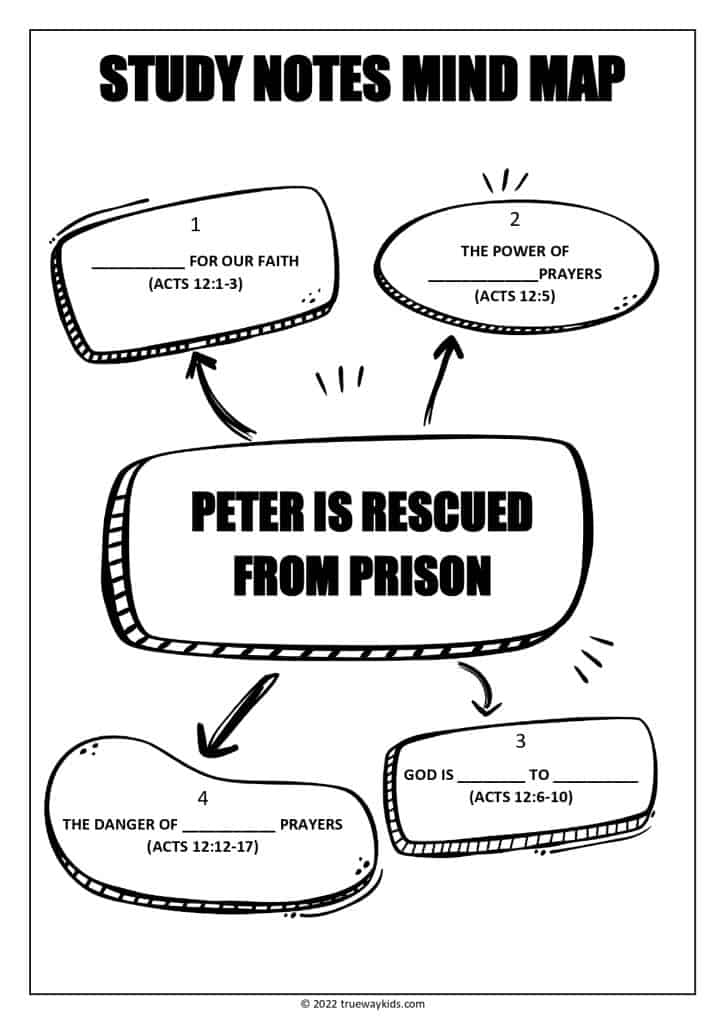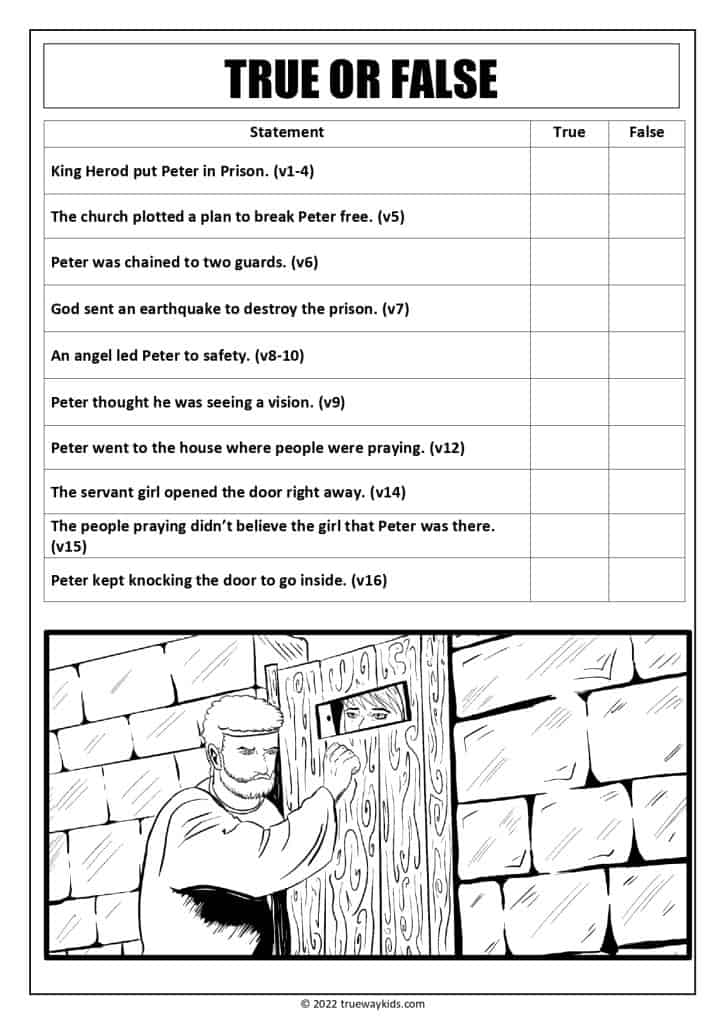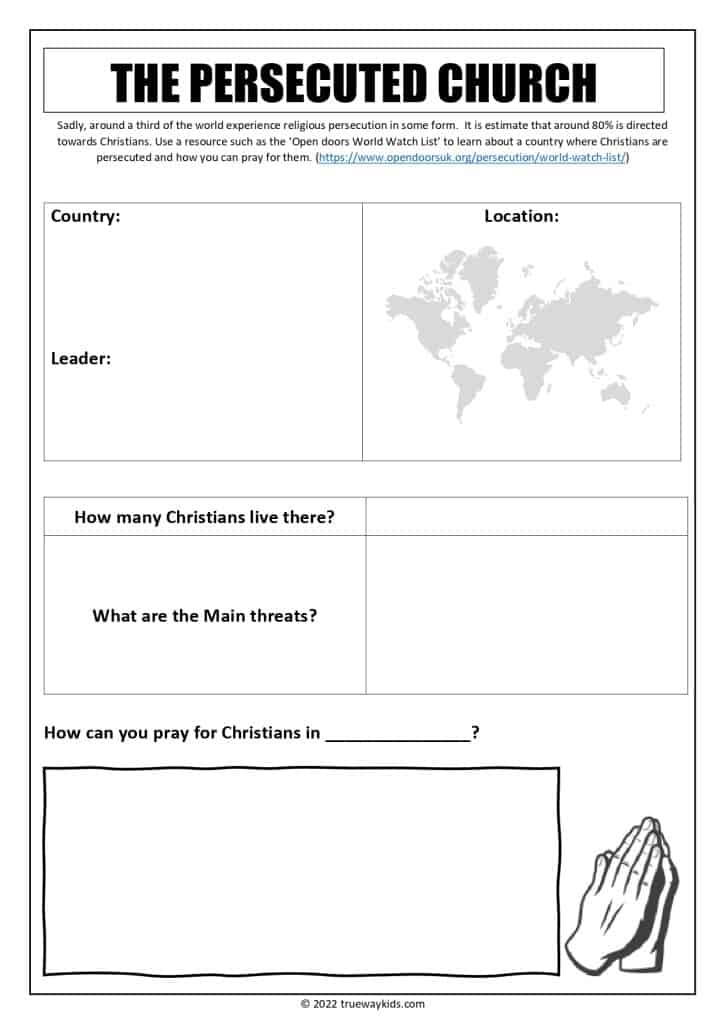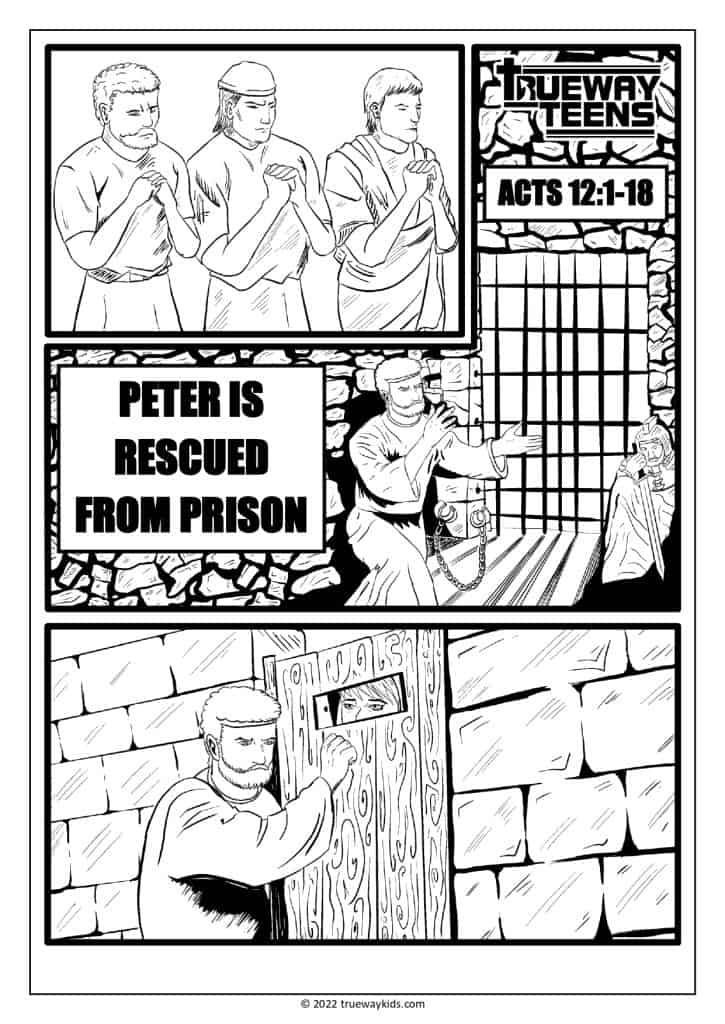In this lesson, we will learn about how Peter was rescued from prison (Acts 12:1-18). This lesson relates to pre-teens and teens and by the end of this lesson, they should have learnt about the following:
- Persecution for the faith.
- The power of constant prayer.
- God is mighty and powerful to deliver.
- The danger of doubtful prayers.
BIBLE PASSAGE: Acts 12:1-18
MEMORY VERSE: “When Peter came to himself, he said, “Now I am sure that the Lord has sent his angel and rescued me from the hand of Herod and from all that the Jewish people were expecting.”” (Acts 12:11).
DOWNLOAD THE FREE PRINTABLE LESSON

BIBLE STUDY NOTES FOR TEENS
The King of the Jewish people at the time, King Herod, was persecuting the Church intensively. He had killed James, one of the original twelve disciples of Jesus. When King Herod realized this pleased the Jews, he went ahead to arrest Apostle Peter.
King Herod put Peter in prison with heavily armed soldiers to keep watch over him. There was no way he could escape. Herod intended to bring him before the people after the Passover.
Meanwhile, the believers met and prayed for Peter. God heard their prayers and did the impossible. He sent his angel to deliver Peter and free him from prison. The angel of the Lord led him through the prison doors, gates and city gates before disappearing.
Peter went to the house of Mary to meet the believers and tell them what had happened. When he arrived, he was met with disbelief.
KEY POINTS FROM THE PASSAGE
1. PERSECUTED FOR OUR FAITH (ACTS 12:1-3)
The early Church was a time of great persecution for those who professed faith in Christ. The Roman Empire, Jewish religious leaders and King Herod were all hostile to Christianity which they saw as a threat. The early followers were often jailed, tortured, and executed. Despite the risks, many people continued to join the Church, and its numbers grew.
From our Bible reading, we observed that the imprisonment of Peter was not on account of any criminal offence or breach of the law. Instead, it was because he believed in the Lord Jesus and witnessed actively about His saving power.
Sadly, up until these present times, there are many opponents to the Christian faith. Persecution displays itself in different forms; some are more visible, such as physical violence and imprisonment. Others are less visible, such as discrimination in the workplace or being denied housing. Others are even more subtle, such as peer pressure to conform to the dominant culture or ridicule in school for your faith.
Jesus warned His disciples of the persecution to follow in Luke 21:12, “But before all this they will lay their hands on you and persecute you, delivering you up to the synagogues and prisons, and you will be brought before kings and governors for my name’s sake.” Philippians 1:29 further states “For it has been granted to you that for the sake of Christ you should not only believe in him but also suffer for his sake,”.
As Christians, we ought to be prepared with this knowledge, and ready to stand our ground even in the light of the persecution or afflictions that may follow.
In the Gospels, we read the account of Peter’s denial of Jesus three times, and after the third time, he wept bitterly. But here in Acts, empowered by the Holy Spirit and changed by Jesus, he is not ashamed to suffer for Jesus. This is an encouragement for us because we know that no matter what we may face in this life, God is with us and will give us the strength we need to overcome.
Peter later said, “Yet if anyone suffers as a Christian, let him not be ashamed, but let him glorify God in that name.” (1 Peter 4:16).
2. THE POWER OF CONSTANT PRAYERS (ACTS 12:5)
King Herod had previously arrested James and killed him. Now he is planning the same fate for Peter. But the prayer of the Church interrupted his plans.
The Church prayed unceasing for Peter’s release, and God heard and granted their request. In 1 Thessalonians 5:17, we are commanded to “pray without ceasing.” This can seem like a daunting task, especially when life gets busy. But if we understand what it means to pray unceasingly, we can see that it is possible.
Prayer is communication with God. It is talking to Him and listening to Him. We can do this throughout the day, whether at school, work, home, or out and about. We can pray while walking, cooking, or even taking a shower. There is no limit to when or where we can pray. The key to praying unceasingly is to keep God at the forefront of our minds.
Often during a trial, we feel it’s easier to pray because we are forced to rely on God for strength and comfort. We realize that we can’t do it on our own. And so, we pray. We pray for His help. We pray for His strength. We pray for His comfort. And we pray for His peace. The key is always to recognize our total reliance on God, not just in difficult situations.
If you find yourself in an impossible situation, the best thing you can do is pray constantly.
3. GOD IS MIGHTY TO DELIVER (ACTS 12:6-10)
Peter was heavily guarded with tight security ensuring he couldn’t escape or be rescued. But in response to the prayer of the Church, God sent an Angel to free Peter.
The Bible is full of examples of God delivering His people from impossible situations. (The Red Sea, Daniel in the Den of Lions, The three Hebrews in the Fiery Furnace, Paul and Silas in Prison and many more.) All these bear witness to the fact that God can do the impossible. The Bible says, ” With men, it is impossible, but not with God: for with God all things are possible.” (Mark 10:27).
No matter what we are facing in life, God is always there for us. He is mighty to deliver according to His perfect will. We can always count on Him to be our strength and our guide.
4. THE DANGER OF DOUBTFUL PRAYERS (ACTS 12:12-17)
In our reading, we see that the Church prayed constantly, yet they somewhat didn’t believe in the power of their prayers. When Rhoda, the young girl, reported the arrival of Peter, they doubted her and called her mad.
When we pray, we are talking to God. It’s a conversation between us and the One who knows and loves us best. But sometimes, our prayers can be full of doubts. We might doubt that God is listening or that He is willing to do anything about our situation.
The Dictionary defines doubt as ‘to call into question the truth and lack confidence in.’ It’s easy to understand how damaging doubt is to our prayer life.
Yet, an amazing truth in this passage is that despite the believers’ doubts, God still heard their prayers and rescued Peter from prison. But just because we have doubts doesn’t mean God can’t work. He can overcome our doubts to help us grow, mature and build faith.
CONCLUSION
The early Church was a praying church. God answered their prayers and rescued Peter from prison. This passage is a reminder that God hears our prayers, and He is faithful to answer them.
No matter what life throws our way, it is essential to strive to be constant in prayer. Life is full of ups and downs, but if we keep our focus on God and maintain a consistent prayer life, we will be better equipped to overcome doubt and trust God in all situations.
YOUTH GAMES AND ACTIVITIES FOR PETER IS RESCUED FROM PRISON
ESCAPE FROM JAIL GAME
- Choose a player to be the prison guard.
- They should sit at the front of the room facing away from the other players with their eyes closed (pretending to sleep).
- All of players line up on the other side of the room behind the guard.
- The players should try to sneak past the prison guard without waking him up.
- Any time the guard hears a noise, he should turn around. Any players he sees moving must return to the starting line.
WHO’S THERE?
- Everyone in the room should close their eyes. Someone leaves the room and stands behind the door of the room.
- Everyone’s eyes must remain closed. The child knocks at the door, and the children ask, “Who’s there?” The child should reply with a funny voice. The children in the room must guess who it is.
- Speak about how the people praying didn’t believe Peter was waiting at the door.
PRAY FOR THE PERSECUTED CHURCH
- Watch a short video or invite a speaker guest to share about the worldwide persecuted church.
- Create cards with the names of the top countries where Christians are persecuted.
- Split children into groups and give them one card. Allow for some discussion time and prayer time in each group.
Free printable Teen Worksheets in the lesson pack








DOWNLOAD THE FREE PRINTABLE LESSON




